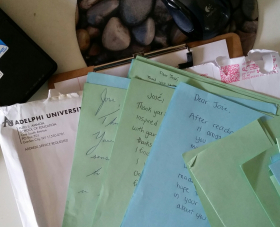Jose Angel Araguz's Blog, page 38
September 2, 2016
* nosing with quevedo & williams
One of the more exciting moments in reading is coming across texts that show a writer’s own reading creeping into their writing. In my own work, I can think of an orange I inadvertantly stole from a Gary Soto poem as well as a prayer reformulated from an Ernest Hemingway short story. These are moments where an influence is unavoidable or inevitable in hindsight. Not outright theft but more moving forward with one’s influences like burrs caught on your clothing after walking through grass.
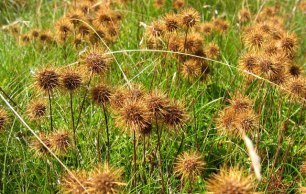 I found such a moment in reading William Carlos Williams recently. While I’ve long admired his poem “Smell” for its ingenuity and directness, learning that he had translated the work of the Spanish Gold Age writer Francisco de Quevedo added another layer of meaning. Quevedo has an infamous sonnet, an “ode” to a rival’s nose, that, when read with Williams in mind, can’t help but conjure up the latter’s own poem. Here are excerpts from Quevedo’s sonnet, “A Una Nariz” (To a Nose):
I found such a moment in reading William Carlos Williams recently. While I’ve long admired his poem “Smell” for its ingenuity and directness, learning that he had translated the work of the Spanish Gold Age writer Francisco de Quevedo added another layer of meaning. Quevedo has an infamous sonnet, an “ode” to a rival’s nose, that, when read with Williams in mind, can’t help but conjure up the latter’s own poem. Here are excerpts from Quevedo’s sonnet, “A Una Nariz” (To a Nose):
Érase un hombre a una nariz pegado,
érase una nariz superlativa,
érase una nariz sayón y escriba,
érase un pez espada muy barbado.
…
Érase un naricísimo infinito
frisón archinariz, caratulera,
sabañón garrafal, morado y frito.
(Once there was a nose with a man attached,
a superlative nose,
a nose both criminal and scribe,
a swordfish with an overgrown beard.
…
It was an infinity of nostrilisticity,
a towering archnose, a mask,
a proud and painful protruding pimple.)
One can see the exaggeration and wordplay of Quevedo’s original influencing Williams’ poem below. While the speaker in the poem by Williams turns the satire on himself, there is no less enthusiasm and barb in his words. Considering the two poems together, I can’t help but view the question asked in the last line of the Williams poem (Must you have a part in everything?) as mirroring the way reading influences writing.
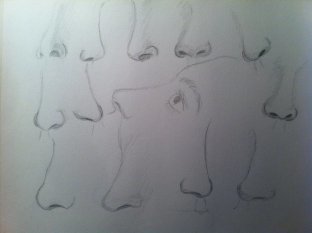
Smell – William Carlos Williams
Oh strong-ridged and deeply hollowed
nose of mine! what will you not be smelling?
What tactless asses we are, you and I, boney nose,
always indiscriminate, always unashamed,
and now it is the souring flowers of the bedraggled
poplars: a festering pulp on the wet earth
beneath them. With what deep thirst
we quicken our desires
to that rank odor of a passing springtime!
Can you not be decent? Can you not reserve your ardors
for something less unlovely? What girl will care
for us, do you think, if we continue in these ways?
Must you taste everything? Must you know everything?
Must you have a part in everything?
*
Happy nosing!
José


August 26, 2016
* birthday conversation with james wright
Depressed by a Book of Bad Poetry, I Walk Toward an Unused
Pasture and Invite the Insects to Join Me – James Wright
Relieved, I let the book fall behind a stone.
I climb a slight rise of grass.
I do not want to disturb the ants
Who are walking single file up the fence post,
Carrying small white petals,
Casting shadows so frail that I can see through them.
I close my eyes for a moment and listen.
The old grasshoppers
Are tired, they leap heavily now,
Their thighs are burdened.
I want to hear them, they have clear sounds to make.
Then lovely, far off, a dark cricket begins
In the maple trees.
*
Since my birthday falls exactly on a Friday this year, I decided to do some extra sharing for this week’s post. First, I will not only present a poem but also present one of my own that is in conversation with it.
First, we have James Wright’s poem above, a short lyric I admire for the way it brings several worlds. The title sets up a casual, almost glib tone, and its directness is interesting to sit with before and after reading the poem. Before reading, the title suggests not simply critique but also a desire to start again via an “unused” pasture. After reading the poem, the title takes on a more literal arc: from the “depressed” start, to the “invitation,” one can see in the title the whole range of emotion traveled in the poem.
While the title is all about directness, the actual poem moves languidly through its details, presenting a counterargument in its indirectness. While the insects are invited in the title, the speaker’s narrative is all about growing closer to the insects, observing their actions through sight and hearing. I say the poem moves languidly, but that is not to say that it is without clarity; in fact, a languid clarity is what is achieved in the pace and directness of the lyric. How else to witness grasshoppers “leap heavily?”
In my own poem in conversation with Wright’s, I found myself pushing against the self in the same spirit of indirectness. Probably telling of my personality that I tend to disappear in poems.
*
after James Wright – José Angel Araguz
Here the poet left
a book of bad poetry
out in an unused pasture.
The grass and dust in his words
carry small white petals
with them into silence.
What I do with the bad
book I’ve become
leaves me behind a stone
that, could it speak,
would speak in pages
about oceans
and about the self
farthered and forgotten.
*
The other bit of sharing I’d like to do is regarding a monopoem series I’m starting. The inspiration for this came from a workshop with Juan Felipe Herrera at this year’s CantoMundo. Among other insights and ideas, one of the things Herrera had us do is take a sheet of paper, fold it in half, and design makeshift literary journal which he called a monopoem. Before leaving the conference, a group of us decided to create monopoems for each other. Here’s the first issue of my own monopoem series, Mosca Dragón:
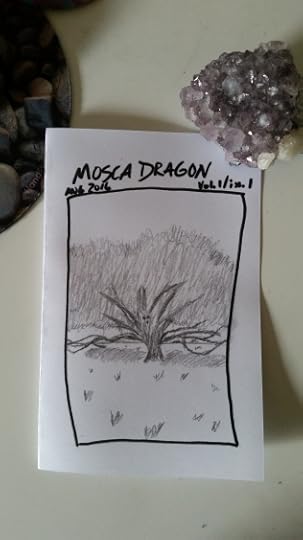
* mesquite front *
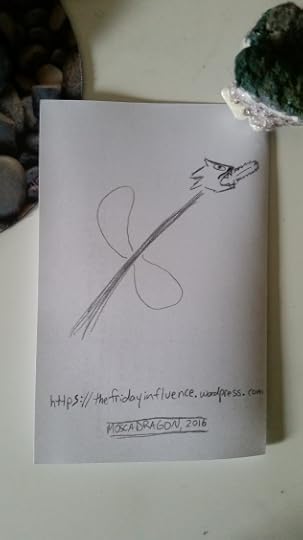
* mosca dragón back *
I’m sharing only what the front and back cover look like as the poem inside (“Mesquite”) didn’t photograph all that well. I had a lot of fun creating this monopoem and plan to continue with other issues. They’re fun artifacts to share at readings. I have already shared some of these with my Canto fam via post as well as with the winners from the giveaway earlier this month.
If you are interested in receiving a copy of the monopoem, feel free to contact me: thefridayinfluence@gmail.com
Happy dragóning!
José


August 22, 2016
* excerpt from The Divorce Suite!
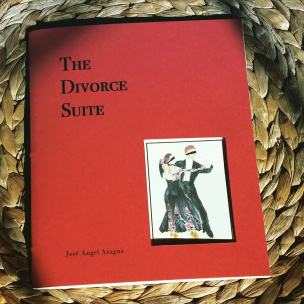
Just a quick post to follow up on the release of my latest chapbook, The Divorce Suite, published by Red Bird Chapbooks!
I’m happy to report that I received my copies. Included in one copy was this guy:
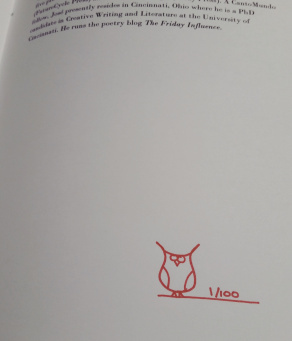
I was really stoked to get the first in the print one of 100!
I also wanted to follow up with an excerpt from the book. Here’s one of the short lyrics that precedes the title poem. A couple of different mythologies get interwoven into the narrative of the collection. Here, I take an indirect approach to Lethe, the river of forgetfulness.
Lethe – José Angel Araguz
My face and neck dripping
with water, I stood before
the bathroom mirror in
a convenience store, hoping
to wash away the scent
of this other woman
I did not want found out,
not until I knew
just what she was to me,
what story to put her in
for the wife I’d yet to leave,
for the wife I felt I couldn’t,
not until I traced
the other’s scent around
my skin, to distinguish,
to make sure – the water
hit, the water cleared,
the water left me
the reflection of
a man smiling,
forgetting in a second
what it was I tried
to hide, and why hide it,
who would drive me to
these waters, and what man
had I been, so wrongfully,
ruinously been,
I laughed at him now,
a different man
behind the eyes
crowned by stray hair,
locked and gleaming
against my skin,
inky letters I knew
I’d have to learn to read.
*
Copies are still available for purchase from Red Bird Chapbooks!
Feel free to share which number you get in the comments.
See you Friday!
José


August 18, 2016
* visiting with gerardo pacheco matus
This week’s poem, “If You Ever Visit Huhi” by Gerardo Pacheco Matus, is accompanied with some comments by the poet talking about the craft behind the poem. I had the distinct pleasure of meeting Gerardo at this year’s CantoMundo conference. Between lectures, workshops, and readings, I had the opportunity to get know him and his work, and I am happy to be able to share some of it here with y’all.
The poem below is full of the heart and wisdom of the poet I met and shared rough drafts with during Canto. What I moved me right away in the poem is the songlike nature, the refrain working nicely to move the poem through various tones of emotion and scenes. I was happily surprised to learn that this poem had its origins in a musical form.
Here is Gerardo on the poem:
I believe that poems or poetry is just another way to tell a story. Indeed, this is what I aim when I am writing a poem.
“If You Ever Visit Huhi” is a poem that uses refrains. At the time, I wrote this poem, I was intrigued/ mesmerized by villanelles. Indeed, this poem began as a villanelle. The repeated line, “if you ever visit huhi” drove me nuts for days. My first attempts of this piece were villanelles, but the poem wasn’t working.
Professor Paul Hoover took a look at the poem, and his first advised was to get rid of the form (villanelle) and let it be. As you may know, I felt puzzled by breaking away from the form, but I knew it needed to be done. I thought that by keeping some elements of the form, in this case the refrains, will be beneficial. I kept the refrains and the narrative element and the poem.
One of the few things I remember or the teaching lesson if you will is to work with form and also experiment with form. I wanted to comply with form so bad that I wasn’t paying attention to other important things in the poem. I wanted to force this idea/ story into a form that wasn’t working. I am glad I broke away from the form and experimented a little.
What I most connect with right away in Gerardo’s comments is that crucial space where a poem begins to move away from the form you originally saw it in and have to begin to trust the poem to guide you in writing it. The move from the villanelle into a longer, more narrative piece made for a strong poem that sings its details. Intuition is innate; but finding the right moment to give over to it is the hard part. Successfully recognizing such moments and following them through with vision and insight can result in astonishingly rich and detailed poems like the one below.
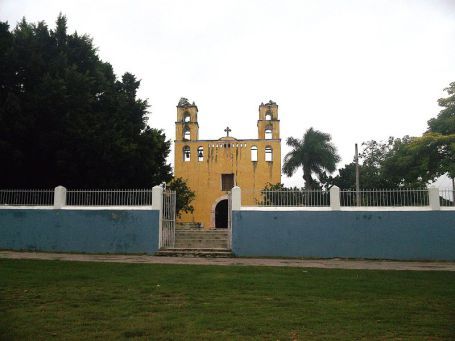
If You Ever Visit Huhi – Gerardo Pacheco Matus
if you ever visit Huhi, find my parents,
they live in a small house with mud walls.
they must be old by now, but they are waiting
for me. tell them you saw me here in the desert,
alone, and thirsty. tell them i want to come back
home to rest in peace in my hammock. tell them
i have not slept for years and i want to dream again.
if you ever visit Huhi, go to the cemetery and find
a grave, newly dug. find don juanito, tell him
i am coming home soon. tell him my parents will
pay him with two chickens and a dove if he gives
me lots of water when the droughts begin,
i am thirsty and you do not know how painful
it is to be thirsty and have no water to drink.
if you ever visit Huhi, find doña micaela,
mi abuela, and tell her to cook me a good cochinita pibil
with lots of red onions, and chiles habaneros.
tell her to bring it to the graveyard every dia de muertos,
so those who have no one to cook for them
can taste it too. tell her i miss her cooking
and her laughter, please if you find her alive tell her
i am always thinking about her and my grandfather, el leñador.
if you ever visit Huhi, go to the church and find
el padrecito and tell him to offer a mass for my
soul, a mass will give me strength. knowing
someone is waiting for me makes me happy.
tell him i am coming home soon, my parents
will pray to the Virgin de Guadalupe a whole year.
tell him if he has some left-over wine, he can
pour some on top of my grave. i am thirsty.
if you ever visit Huhi, wait in the dark alleys
i once roamed, listen to my cries, be silent, do not
be afraid, as it is only me, your old friend,
the one who roams the desert alone. soon, i will arrive
at the town where i was born many summers ago.
if you ever visit huhi, visit the lagoons,
you will find me there drinking
water as i am dead and very thirsty.
This poem was published in Howard University’s Amistad Literary Journal, fall/ winter 2010
*
Happy visiting!
José
P.S. Make sure to check out my post earlier this week regarding my new chapbook, The Divorce Suite!


August 15, 2016
* new chapbook: The Divorce Suite!
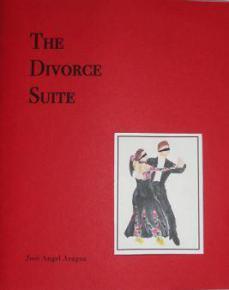
Just a quick post to announce the release of my latest chapbook, The Divorce Suite, published by Red Bird Chabooks! Copies can be ordered here.
This chapbook centers on a series of poems inspired by my divorce back in 2010. It takes on the idea of divorce as a fulcrum into change, the narrative itself playing out in various forms: from makeshift sonnets, tanka sequences, and the lyric/prose hybrid of the title poem, to the mutated sestina that closes the book, divorce is seen as both event and momentum.
These ideas are embodied in the following lines from Paterson by William Carlos Williams which serve as an epigraph for the chapbook:
Divorce is
the sign of knowledge in our time,
divorce! divorce!
with the roar of the river
forever in our ears…
The particular river that runs through this chapbook is the Willamette, as much of the telenovela that was my first marriage played out in Eugene, Oregon.
One of the reasons I’m especially excited about this project is that it brings together a specific sequence of poems around this subject. While the title poem and a small selection of other poems from this chapbook will be featured in my next collection, Small Fires (due out in 2017), this chapbook presents its own particular reading experience. The difference is similar to having a radio edit versus hearing the full version of a song.
Special thanks to Eric Hove & Sarah Hayes for being great to work with as well as to everyone at Red Bird Chapbooks! RBC’s chapbooks are hand-crafted art objects, making this publication all the more special.
Red Bird Chapbooks is planning a print run of 100 copies, so please hurry and snag a copy!
Happy Red Birding!
José


August 12, 2016
* microreview & interview: jeff sirkin’s travelers aid society
After having done a couple of “microreview & interviews” for the Cincinnati Review blog, I have decided to incorporate the form into The Friday Influence. Essentially, I’ll highlight a couple of poems as well as responses from the poet to a question or two specifically about influences. My goal remains centered on sharing things I’ve read and want to share with the community of readers of this blog, as well as to promote specific poets and be a poetry ambassador in general.
I plan to do one microreview & interview about every two months, posting on Mondays typically, except for this first one which I wanted to highlight today.
Below is the first official TFI microreview & interview featuring Jeff Sirkin’s Traveler’s Aid Society.
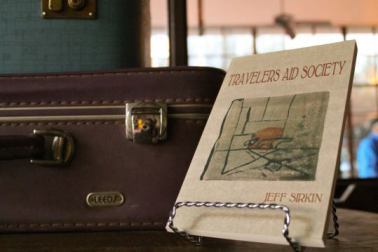
Another Repair – Jeff Sirkin
How long will I wait at the garage
knowing the seals are shot
and thinking about the plumber
again with his hand out
always on his way?
We’re entering a dark place
but can’t we just stand
with the company to whom
we’ve committed ourselves?
And someone turns up
the ever-present television
(a bad plot device I think),
Cable News like an epidemic
blaring the failure of the new
administration to eliminate Mexico
The mechanic wiping his hands
Maybe if you changed the filter
every once in a while, he shrugs,
you’d have a chance
But I’m not, I assure him,
one to play the odds
unless you count the Folger’s coffee
burning away in its pot all morning
a product of Proctor and Gamble
my hometown’s biggest employer
a source of pride and soap.
They’ve kept the city afloat
for a century.
You must realize, he continues,
it’s hopeless. Meaning “No future,”
I translate, eyes on the TV footage
of another immigration crisis.
I’ve heard it before
and seeing as I’m not going anywhere anytime soon
I’ll hear it again.
What do you think? I ask.
Well, he offers, the coffee’s always terrible.
No, man, try to keep up,
Will I make it home?
*
I chose this poem specifically from the book because it serves as a good example of the way Sirkin is able to blend intimate intellectual insights with moments from day to day life throughout Travelers Aid Society. The language and phrasing of the second stanza, for example, is the kind of poetically charged statement that points beyond its meaning within a narrative. The words “a dark place” and “company” have their place in terms of politically conscious tone of the poem, but implied also is human company as well as the corporate type (like Proctor and Gamble mentioned later). A collection whose “home” ranges from the poet’s experiences in El Paso, Buffalo, and Cincinnati, this kind of linguistic friction works to humanize where the poet is at, mentally as much as geographically.
Waiting in the garage for something to be fixed, this speaker’s meditation is quickly colored by the “bad plot device” of a TV in the background. This self-aware move on the part of the poet does two things: 1) shows an awareness of the kind of narrative his speaker has entered, but also 2) serves to reach after a way to control and subvert that narrative. I read the way each narrative element in the poem – the waiting, the TV, the small talk between mechanic and speaker – end up tumbling together by the end as making this kind of subverting necessary. Through juxtaposition of thought, detail, and dialogue, the poem itself seems to be trying to respond to the urgency behind the speaker’s words at the end when he says, “try to keep up.”
This feeling of trying to keep up via poetic means remains constant throughout the collection. What the poems try to keep up with for the most part is history, both in terms of personal memory and the history forgotten/neglected in documents and archives. The title poem, included below, is a good example of the way these two sides of history can be in dialogue in a poem. In the crucible of the poem, memory and archives help create a space outside themselves that allows for history to move beyond its own established narratives.
Travelers Aid Society – Jeff Sirkin
The hill falls, the daily paper shrinks.
In the kitchen Dad laments the collapse
of state funding for public institutions
and calls out headlines over morning
cereal. “Smog Alert in Effect.” “Streetcar
Called Waste of Taxpayer Money.”
We chew on our toasted oats
and pretend the coffee’s better
because of the new machine.
I remark on the efficiency of the
shower drain, the empty gates
at the shuttered airport terminal, my research
plan for the Historical Society library.
The coffee demands empathy.
The meteorologist predicts
more of the same. Dad claims
he speaks from self-interest.
“Youth Police Cadets in Training.”
“Drought Cited in Fireworks Ban.”
“Bankrupt Airline asks Fed to Assume Responsibility
for Pension Promises.”
Call it my empire of repurposed
paper. My network of convenience packaging.
My ruin in reverse.
At the research library I search for traces
of Jeff Davis, the self-proclaimed King of the Hoboes,
but find outdated property maps and lectures
lamenting the great surplus of excellent projects
seeking capital.
I search for The Jungle Scout. The Hobo News Review.
The Travelers Aid Society.
I find a scale model of the old baseball stadium
and snap a photo from high-above the left field fence,
but no one cares to comment.
I read about railroad speed, railroad case,
and railroad convenience. I find notes
from shareholders meetings
of a hundred defunct railroad companies.
Danville and Pottsville. Greenville and Miami.
Sunbury and Erie. Hillsborough and Cincinnati.
The first in the West is the Little Miami,
incorporated 1836, completed 1846. It runs
along its namesake river on the east side of town
north to Springfield, surviving
as a corporation until 1981, when it is
merged out of existence, the dormant rails ripped
from their beds, the right-of-way developed
into a bike trail.
The museum laughs. The archive
pleads for mercy. I make an offer
to the stationary loop
of the evening commute.
Billie Holiday sings,
“I’ve been around the world in a plane,
settled revolutions in Spain,
the north pole I have charted,
but can’t get started with you.”
Out on the interstate
three black me balance
against the highway embankment
hacking weeds and sowing seed aggregate
to arrest the sliding soil.
Over their heads the sagging fence beckons,
the family-friendly chain restaurant glowing
just out of reach.
*
Influence Question: There is an interest in the title poem and elsewhere with researching hobo culture. Can you speak a little about this interest as well as the overall political framework of this book?
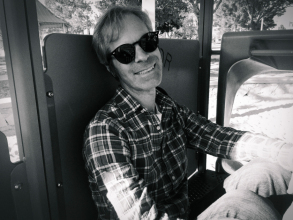 Jeff Sirkin: “My interest in hobo culture emerged from several things. One of these was Kerouac’s On the Road, which I’ve taught a number of times over the past several years, and which, despite its flaws, I continue to find compelling. Among other things, the novel creates a spectrum of different character types found “on the road” (from commuters, to tourists, to college students on summer adventures, to itinerant workers). Of these, hoboes are regarded as the most pure, having achieved almost a state of grace in their rootless wandering. As if, having committed themselves to the road (and thus movement) instead of some tenuous dream of property and “home,” they’ve separated themselves from the consumer capital/ industrial/ modern world, and thus exist almost as holy ghosts, skirting the edges of our reality and perception, visible only to those open to seeing beyond the reality of workaday life. Free, in a sense of the ideological frames and boundaries refracted in and through our bodies as our daily lives and dreams.
Jeff Sirkin: “My interest in hobo culture emerged from several things. One of these was Kerouac’s On the Road, which I’ve taught a number of times over the past several years, and which, despite its flaws, I continue to find compelling. Among other things, the novel creates a spectrum of different character types found “on the road” (from commuters, to tourists, to college students on summer adventures, to itinerant workers). Of these, hoboes are regarded as the most pure, having achieved almost a state of grace in their rootless wandering. As if, having committed themselves to the road (and thus movement) instead of some tenuous dream of property and “home,” they’ve separated themselves from the consumer capital/ industrial/ modern world, and thus exist almost as holy ghosts, skirting the edges of our reality and perception, visible only to those open to seeing beyond the reality of workaday life. Free, in a sense of the ideological frames and boundaries refracted in and through our bodies as our daily lives and dreams.
“Secondly, in April 2011, just as I was really getting started on this book, a friend of mine from Cincinnati—a musician and wanderer and free spirit—was shot and killed by a police officer in Cincinnati under confused and suspicious circumstances. I discovered only after his murder that he had lived as a hobo at one time. The idea of the hobo had already come up in some of the poems, but this incident brought to the fore some of the issues and themes I was already starting to think about: frames and boundaries; property; what “inside” is and means; what it might mean to be “outside” and what the cost to transgress that border; the structures of power that create and hold us as subjects. And this is not to forget what the cost for those who by virtue of the color of their skin or nationality or background or sexual orientation or identity or expression aren’t given the option to ‘choose’ their own relationship to culture, whose status as “outlaw” is imposed upon them from the start.
“Finally, early on as I was researching both hobo history and Cincinnati, I discovered that Cincinnati was, in the early part of the 20th century, an important locus for hoboes and hobo history. Jeff Davis—self-styled “King of the Hoboes” and founder of a chain of cheap lodging houses in cities across the U.S. called “Hotel de Gink” (“established, ran by, and for hoboes”)—was born in Cincinnati in 1883. He hit the road at the age of 13, traveled the world as a hobo, and was a leader in hobo culture, working tirelessly for hobo rights (and labor rights), founding and leading the Hoboes of America organization for many years. He died in his hometown of Cincinnati in 1968, at the age of 84. It remains curious to me, having grown up in Cincinnati and having lived there as an adult for many years, and then returning to do research there, not only that I’d never heard about Cincinnati’s hobo history, but that I couldn’t find a trace of it. Maybe it was never recorded; maybe it’s been forgotten; maybe intentionally erased. For me, it became a ghost whispering about a city that may or may not exist in the shadows of the one I think I know.
“There is a mythology surrounding hoboes and hobo culture dating back to their heyday, the turn of the last century (at least), in which hoboes represent freedom, escape, and living a heretofore unrecognized alternative existence. I was interested in that mythology, as well as its real connections to the city I was writing about. In the book it becomes a kind of limit, I think, or maybe a faulty utopian dream, a big rock candy mountain that, despite its romantic appeal, might also function to mystify us to alternative ways of thinking freedom.”
*
Final thoughts: Reading this collection, I admired how the layers of memory and fact kept being acknowledged and explored throughout. One of the poetry’s responsibilities, according to these poems, would seem to be listening in on and recording what we can of the ghosts around us. Poetry, then, can be seen as one way to resist settling for the prescribed narratives expected of us and also a means to finding one’s own path to the rest of the story.
*
Travelers Aid Society can be purchased from Veliz Books. Special thanks to Jeff Sirkin for participating in this microreview & interview! To find out more about his work, visit his site.
Happy aiding!
José


August 10, 2016
* quick chapbook news!
Just a quick post to make a few announcements and share some news:
I am happy to report that my next chapbook, The Divorce Suite, will be out in a week or two by Red Bird Chapbooks. This chapbook will have an initial run of 100 copies. More info soon!
Here are links to some recent online publications that I feel are definitely worth reading and supporting. The first is Glass: A Journal of Poetry’s recent Orlando tribute feature “Pulsamos: LGBTQ Poets Respond to the Pulse Nightclub Shooting.” Some great poems in there from Emily Rose Cole, Steven Sanchez, and Darrel Alejandro Holnes among other fine work. The other recent publication I’d like to share is the first issue by The Deaf Poets Society: an online journal of disability literature & art. Some strong work from Leah Lakshmi Piepzna-Samarasinha and Mary Peelan among others. Here’s an article on this new online journal from PBS.
Lastly, I’d like to thank everyone who entered the Goodreads giveaway. Out of 500 plus entries (each time I think of this number = Wow! *gasp*), 10 were chosen by Goodreads to received signed copies of my chapbook, Reasons (not) to Dance (FutureCycle Press). Those copies should be out shortly. Everyone be on the look out next month for another giveaway, this time of my first full book of poems, Everything We Think We Hear (Floricanto Press).
See you Friday!
José


August 5, 2016
* grounding with natasha tretheway
Letter – Natasha Tretheway
At the post office, I dash a note to a friend,
tell her I’ve just moved in, gotten settled, that
I’m now rushing off on an errand—except
that I write errant, a slip between letters,
each with an upright backbone anchoring it
to the page. One has with it the fullness
of possibility, a shape almost like the O
my friend’s mouth will make when she sees
my letter in her box; the other, a mark that crosses
like the flat line of your death, the symbol
over the church house door, the ashes on your forehead
some Wednesday I barely remember.
What was I saying? I had to cross the word out,
start again, explain what I know best
because of the way you left me: how suddenly
a simple errand, a letter—everything—can go wrong.
**
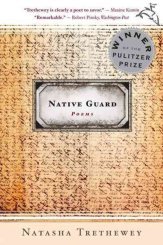 At CantoMundo this year, I had the opportunity to listen to keynote speaker and former U.S. Poet Laureate Natasha Tretheway speak about her work and the place of memory in her work. Her poems about her mother specifically have meant a lot to me over the years. The poem above, for example, shows how sometimes the things we write about find us, how “material” arises from the immaterial, day to day occurrences.
At CantoMundo this year, I had the opportunity to listen to keynote speaker and former U.S. Poet Laureate Natasha Tretheway speak about her work and the place of memory in her work. Her poems about her mother specifically have meant a lot to me over the years. The poem above, for example, shows how sometimes the things we write about find us, how “material” arises from the immaterial, day to day occurrences.
Poems about my father’s death and absence in my life continue to come, and sometimes I worry about repeating myself. On the practical front, I work hard to keep the poems alive in different ways, whether through new forms or structural framework. But there is always the question: How big is grief? How long? That the poems keep coming means that I am far from knowing the answer to such questions.
One of the things that keeps me grounded is hearing about the experiences of others. Tretheway’s book, Native Guard, remains important for several reasons, the most prominent being the title poem’s engagement with history and evocation of human experience. But the poems about the poet’s mother mean something deeper for me, and it is something that I feel informs the emotional scope of the collection. There are times, as in this second poem below, where I feel I am reading a poet who understands what it means to make peace with what overwhelms you as much as you can in the moment.
At Dusk – Natasha Tretheway
At first I think she is calling a child,
my neighbor, leaning through her doorway
at dusk, street lamps just starting to hum
the backdrop of evening. Then I hear
the high-pitched wheedling we send out
to animals who know only sound, not
how they sometimes fall short.
In another yard, beyond my neighbor’s
sight, the cat lifts her ears, turns first
toward the voice, then back
to the constellation of fireflies flickering
near her head. It’s as if she can’t decide
whether to leap over the low hedge,
the neat row of flowers, and bound
onto the porch, into the steady circle
of light, or stay where she is: luminous
possibility–all that would keep her
away from home–flitting before her.
I listen as my neighbor’s voice trails off.
She’s given up calling for now, left me
to imagine her inside the house waiting,
perhaps in a chair in front of the TV,
or walking around, doing small tasks;
left me to wonder that I too might lift
my voice, sure of someone out there,
send it over the lines stitching here
to there, certain the sounds I make
are enough to call someone home.
*
Happy calling!
José
P.S. This weekend marks the last chance to enter my Goodreads Giveaway for one of ten signed copies of my prose poem chapbook, Reasons (not) to Dance. Details below!
Goodreads Book Giveaway

Reasons (not) to Dance
by Jose Angel Araguz
Giveaway ends August 07, 2016.
See the giveaway details
at Goodreads.


August 3, 2016
* new review at queen mob’s tea house
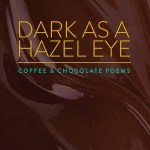 Just a quick post announcing my review of Dark as a Hazel Eye Coffee & Chocolate Poems which can be read at Queen Mob’s Tea House.
Just a quick post announcing my review of Dark as a Hazel Eye Coffee & Chocolate Poems which can be read at Queen Mob’s Tea House.
Reviewing this particular anthology allowed me to do a little memory lane, recalling some brief episodes in my life as a barista, and using them as a preface into talking about the book.
Special thanks to Ruben Quesada and Erik Kennedy of QMTH for their editorial guidance. A big thanks as well to Vasiliki Katsarou, Editor-at-Large of Ragged Sky Press, for making a copy of the anthology available to me.
See you Friday!
José!


July 29, 2016
*resonating with josé antonio rodriguez
Last week had me both at the Alice Hoffman Young Writers Retreat at Adelphi University in Garden City, New York, as well as in Austin, Texas for the CantoMundo conference. It’s a little more rocknroll that I’m used to, but I had a blast!
Here’s a pic of one of the nice surprises from last week: a collection of personal notes from the young writers I worked with at Adelphi. I can’t begin to express the gratitude I feel at being given the opportunity to share my work and talk poetry with others. Thank you to all who attended my talk on lyrical prose and who have since reached out since then! Keep the words coming, for yourself and for others!
Each year, CantoMundo hosts a poetry workshop for Latina/o poets that provides a space for the creation, documentation, and critical analysis of Latina/o poetry. This year was the conference’s last time in Austin, and it was nothing short of spectacular! I was able to be in workshops led by Texas State Poet Laureate Carmen Tafolla one day, and one led by the current Poet Laureate of the United States, Juan Felipe Herrera. Both poets presented themselves as forces of nature as well as generous guides. Highlights included the readings on Friday and Saturday at the Spider House Ballroom. I read on Saturday, specifically “Drinking at Home” and “Directions” from Everything We Think We Hear.
 One of my favorite things to do at CantoMundo is to geek out about my favorite poems by the poets who wrote them and who happen to attend the conference. The poem below by José Antonio Rodriguez originally appeared in the February 2012 issue of Poetry magazine. I remember copying it out by hand at a bookstore and marveling at the raw imagery, from like a thousand ticks turning their backs to the “halos” at the end. What continues to move me even now in reading is how the imagery is packed with so much emotional resonance, pointing to things hidden as well as things almost there.
One of my favorite things to do at CantoMundo is to geek out about my favorite poems by the poets who wrote them and who happen to attend the conference. The poem below by José Antonio Rodriguez originally appeared in the February 2012 issue of Poetry magazine. I remember copying it out by hand at a bookstore and marveling at the raw imagery, from like a thousand ticks turning their backs to the “halos” at the end. What continues to move me even now in reading is how the imagery is packed with so much emotional resonance, pointing to things hidden as well as things almost there.
***
Sunflowers – José Antonio Rodriguez
No pitying/”Ah” for this one – Alan Shapiro
No, nor a fierce hurrah
for what it does without choice,
for following the light
for the same reason the light follows it.
Just a thing rough to the touch, a face
like a thousand ticks turning their backs,
suckling at something you can’t see,
and a body like a tag off the earth
so that my child hands couldn’t tear it out
from the overgrown lot next door.
………………………….My palms raw with the shock
of quills and spines. Its hold like spite, and ugly
except when seen from a distance—
a whole field of them by the highway,
an 80-mile-per-hour view
…………………………..like a camera’s flash.
All of them like halos
without saints to weigh them down.
*
Happy halo-ing!
José
p.s. One week left to enter the Goodreads giveaway for Reasons (not) to Dance! Details below!
Goodreads Book Giveaway

Reasons (not) to Dance
by Jose Angel Araguz
Giveaway ends August 07, 2016.
See the giveaway details
at Goodreads.



